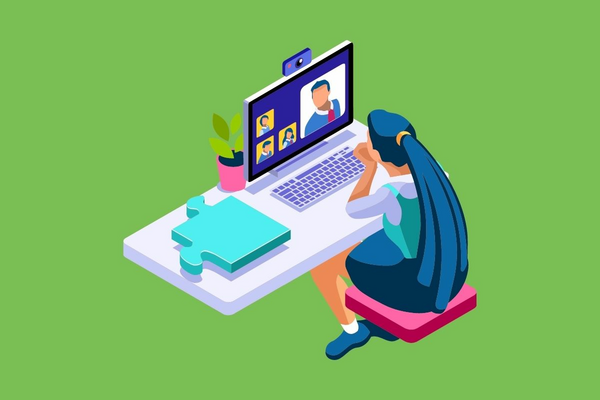Lately, there have been many discussions about the pros and cons of working from home as businesses decide whether employees should return to the office full-time in a post-lockdown world or move permanently to a hybrid working model. And while there are opinions on both sides, there’s one thing that most people can agree on: working from home definitely affects productivity. But how exactly does it affect productivity, and is it good or bad?
Working from home can have a number of benefits, including increased flexibility and decreased commute times. However, working from home can also negatively impact productivity. One way to combat this is by using a DISC profile to better understand your employee’s working style and how to improve it.
Let’s take a closer look at some of the potential pros and cons of working from home to help answer that question.
What is Working From Home (WFH)?
Working from home is when an employee works outside of a traditional office setting. This could mean working from a home office, a coffee shop, or even a coworking space. The acronym WFH is an abbreviation for working from home and indicates that an employee is working from their home, apartment, or place of residence rather than the office.
Many businesses have a WFH policy, often known as a remote work policy, that allows their employees to work from home either, part time, full-time or as needed.
Thanks to video conferencing tools and collaboration technologies, coworkers can interact and keep in contact regardless of their physical location. There are also WFH positions that are entirely remote, requiring employees to work from home every day. Employees who work from home frequently have a home office or specific workstation where they can concentrate and be productive.
There are several reasons why someone might choose to work from home, including:
- decreased commute times
- the ability to work around family obligations
- increased flexibility in terms of hours and working location
- no need for business casual attire
What are the pros and cons of working from home?
There are several potential benefits and drawbacks to working from home. It’s important to consider both the pros and cons before making the decision to work from home, as it’s not right for everyone.
The Advantages of Working From Home
There are several advantages to working from home for employees and employers alike. Some of the potential benefits of working from home include:
- decreased commute times
- increased flexibility in terms of hours and working location
- no need for business casual attire
- improved employee retention
- attract new talent
- increased productivity
- increased staff motivation
- better work-life balance
Decreased commute times
Decreased commute times is one of the primary benefits of working from home for employees. The average commute time per day in Australia since this decade began has increased from 40 minutes to 48 minutes, an increased commute time of 20%, shows the latest data from HILDA. Workers now spend on average 4.5 hours a week getting to and from work, a rise of 23% since 2002.
Increased flexibility in terms of hours and working location
Employees may be better suited and more ready to work flexible hours, such as earlier or later in the day, or even on weekends, if they are no longer tethered to an office. This may help you satisfy specific company demands, such as interacting with clients or suppliers in a different time zone.
No need for business casual attire
Working from home generally means that there is no need to wear business casual attire, as you would in an office setting. Although, this can be a pro or a con, depending on your personal preferences.
Improved employee retention
Working from home can improve employee retention as it gives employees the flexibility they need to better manage their work life balance.
Attract new talent
Company benefits are a great way to attract, retain, and reward employees. Businesses that adopt the hybrid workplace and flexibility to work from home will be more likely to attract new talent. With 40% of Australian workers preferring to work at home full time, this is a great advantage to working from home.
Increased productivity
Working from home can lead to increased productivity. A study by Stanford University of 16,000 workers over nine months found that working from home can lead to a 13% increase in productivity. Stanford attributed the increase in performance to more calls per minute due to a quieter, more convenient working environment and working more minutes per shift because of fewer breaks and sick days. Interestingly, the same study also reports improved work satisfaction, and attrition rates decreased by 50%.
Increased staff motivation
One of the potential advantages of working from home is that it can increase staff motivation as employees feel more trusted and have more control over their working environment.
Better work-life balance
Working from home can lead to a better work-life balance as employees have more control over their working hours and environment. This can lead to increased productivity and motivation as well as decreased stress levels.
The Disadvantages of Working From Home
So there are quite a few pros when it comes to working from home, but there are also some potential cons that businesses should consider. These include:
- distractions from family, roommates, or pets
- difficulty staying focused without a set schedule or routine
- feelings of isolation or loneliness
- difficulty monitoring performance
- potential burnout
- information security risk
Distractions from family, roommates, or pets
One of the potential disadvantages of working from home is that there can be more distractions from family, roommates, or pets. It’s important to set up a dedicated workspace and establish boundaries with family and roommates to avoid distractions.
Difficulty staying focused without a set schedule or routine
Another potential disadvantage of working from home is that it can be difficult to stay focused without a set schedule or routine. It’s important to establish a daily routine and stick to it as much as possible.
Feelings of isolation or loneliness
Working from home may increase feelings of isolation or loneliness among employees. It’s important to make sure you take breaks throughout the day to socialise. As a manager, a daily check-in with your team or encouraging social team-building games can mitigate these feelings.
Difficulty monitoring performance
Working from home can make it difficult for managers to monitor employee performance. Different personalities may also respond to monitoring with varying degrees of positivity. It’s important to set up clear expectations and communication channels. You could look at setting goals and targets with workers that are easily measured so that if they are not meeting their targets, you can identify and remedy any performance issues at an early stage.
Potential burnout
Working from home can lead to potential workplace burnout as employees feel like they are always working. It’s important to take breaks throughout the day and establish a healthy work-life balance.
Information security risk
Information security problems could be more likely to occur when staff work from home. It’s important to have a secure and reliable working from home set-up. You should also have clear policies and procedures in place for working with sensitive information.
How Working from Home Affects Productivity
There are both advantages and disadvantages to productivity when working from home. Establishing a dedicated workspace, setting up clear expectations, and taking breaks throughout the day to avoid distractions and burnout, are important. As a manager, you should also regularly check in with your team to monitor performance and address any issues early on. Working from home can lead to increased productivity if done correctly, but it’s important to be aware of the potential risks involved.
DISC can help increase productivity while working from home by providing individuals with insight into their own personal strengths and weaknesses as well as how they interact with others. DISC can also help managers identify areas where employees may need more support or training when working from home. By understanding the different personality types, managers can provide employees with the resources and support they need to be productive while working from home.
How to Stay Productive When You Work from Home
Working from home has its benefits, but it can also be tough to stay productive when you’re not in an office setting. Here are a few tips to help you stay on track when working from home.
- Establish a routine and stick to it. Waking up at the same time each day, taking breaks, and working regular hours will help you maintain a sense of normalcy.
- Take advantage of technology. Utilise video conferencing tools like Skype or Zoom to stay in touch with your team and collaborate using online tools like Google Drive or Dropbox.
- Make sure you take breaks. Get up and walk around, or step outside for some fresh air to clear your head.
- Create a dedicated workspace. Having a specific area in your home that is designated for work will help you focus, avoid distractions and be more productive.
- Set boundaries. Let your family and friends know when you are working, so they respect your time and privacy.
Working from home can be an effective way to increase productivity and improve work/life balance.
Tips for Setting Up a Productive Workspace at Home
Now that we’ve looked at the pros and cons of working from home let’s look at some tips for setting up a productive workspace at home.
First, it’s important to find a dedicated space for your work. This could be a spare room, a corner of the living room, or even just a small desk in your bedroom. It’s important to have a space that is quiet and free from distractions.
Next, you’ll need to make sure you have the right equipment. A laptop or desktop computer, a printer, and a comfortable chair are all essential for working from home.
It’s also important to have good lighting in your workspace. Natural light is best, but if you don’t have access to that, then make sure you have a good desk lamp to provide adequate light.
Finally, you’ll want to make sure your workspace is organised and clutter-free. A tidy desk will help you stay focused and productive.
Strategies for Avoiding Distractions When You Work from Home
One of the biggest challenges of working from home is avoiding distractions. Here are a few strategies you can use to stay on track.
- Set boundaries with family and friends. Let them know when you are working and cannot be interrupted.
- Turn off your phone or put it on silent. This will help you avoid distractions from calls, texts, and social media notifications.
- Close the door to your workspace. This will help reduce noise levels and give you some privacy.
- Invest in noise-cancelling headphones. If you work in a noisy environment, these can be a lifesaver.
Working from home can be a successful way to increase productivity, but it’s important to be aware of the potential risks to productivity and take steps to avoid them. DISC can help you identify your strengths and weaknesses so that you can take steps to improve your productivity while working from home.
How DISC can help increase productivity while working from home
Working from home can be a great way to increase productivity, but it’s important to be aware of the potential risks to productivity and take steps to avoid them. DISC profiles can help
The DISC model is a tool that can be used to assess the personality type of your employees. DISC can help you understand your strengths and weaknesses. It can also help you identify your working style and how to best use your time while working from home. By understanding employee personalities, businesses can create work environments that are better suited to their needs. This leads to happier, more productive employees and reduces turnover.
When working from home, it is important to remember that not everyone is the same. Some people may thrive in a quiet, isolated environment, while others may feel lonely and disconnected. It is important to find a working from home arrangement that works for you and your employees. If you are having trouble with productivity, consider using the DISC model.
DISC personality profiling can help individuals understand their own productivity triggers and how to best work from home. By understanding your personal DISC profile, you can learn what working environment will allow you to be the most productive. For example, if you are someone who thrives on social interaction, working from home may be more challenging for you as you may feel lonely or isolated.
If you want to learn more about DISC, please visit our website or contact us to speak with one of our experts.




